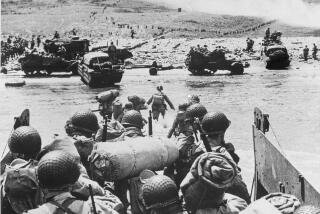Perspectives on Waging War : Tricking Hitler: Spies, Lies, Ultra Intelligence : The spy wars that preceded D-day gave the Allies a critical edge; counterintelligence is by no means a ‘sideshow.’
- Share via
In the coming days, we will celebrate the spectacular achievements, and honor the tremendous sacrifice, of D-day--June 6, 1944. But the retelling of the massive invasion--5,000 ships, 20,000 vehicles, 150,000 soldiers on June 6 alone--will be incomplete if we do not recall that D-day’s success was made possible by a counterintelligence operation so well-planned and coordinated that it remains to this day a standard of excellence.
British security forces were remarkably successful in detecting German spies sent to infiltrate the United Kingdom. Some were hanged, some imprisoned, but a number were turned into double agents by MI5, British counterintelligence. Through these double agents, the Allies learned what Nazi intelligence wanted to know and by inference, Nazi strategic designs. They also became part of an elaborate network of real and fictitious spies (the “double-cross system”) that was used to feed false and misleading intelligence back to Berlin, including supposed plans and preparations for the Allied invasion of France.
A second critical element was the British ability to intercept and decode many Nazi military, diplomatic and intelligence communications. With assistance from Polish and French intelligence before the war and also from German security officials who refused to believe their codes had been broken, British cryptologists cracked “Enigma,” Germany’s sophisticated electro-mechanical enciphering machine. Known as “Ultra,” the decoded German messages became the most closely guarded secret of the war.
Double agents in place and Enigma broken, the infrastructure was set for a grand deception. The Allies had two goals: to mask the initial assault on Normandy and to buy time to gain a foothold in coastal France. The ruse they came up with was the linchpin of the invasion strategy.
First, they had to persuade Hitler that the invasion would not take place at Normandy, but to the north at Calais. This was logical, since Calais is at the narrowest part of the English Channel. In the months leading up to D-day, what appeared to be a massive Allied buildup was deployed across from Calais in eastern and southeastern England. German reconnaissance planes spied this assemblage of tanks, barges and aircraft, but did not detect that most were made of plywood, paint and tarpaulin. Nor, because of artful Allied security, did they detect the building of the massive, man-made “harbor” for use at the Normandy beaches. And finally, German intelligence intercepted supposed Allied radio communications that were really the phony chatter of a nonexistent army over which a real U.S. general, George Patton, presided.
Because of Ultra, the Allies knew that Hitler had swallowed the bait. But it was not enough to simply shield the June 6 assault. Success depended on persuading Hitler that Normandy was a feint to mask the “real” assault at Calais.
The Allies made a bold gamble. They provided the Germans advance notice of the Normandy invasion’s beginning. British double agent Juan Pujol Garcia--code-named Garbo--tipped his German handlers of the landing hours before the first wave of men and equipment hit the beach.
Too late to do the Germans any good, Garbo’s warning cemented his credentials as a top spy, setting the stage for a more critical step in the deception effort.
By June 9, 1944, German generals were clamoring for reinforcements in Normandy. Hitler initially complied. But then Garbo urgently reported that all of his agents--all fictitious creations of MI5--were convinced that Normandy was a diversion. The real strike, Garbo insisted, would still be at Calais.
Hitler read Garbo’s cable and rescinded the order to reinforce Normandy. For critical weeks after D-day, Hitler continued to hold in reserve more than a quarter-million German soldiers, awaiting the much-anticipated Allied attack at Calais.
So what is the lesson for today to be drawn from D-day?
At a minimum, it challenges the notion that “spy wars are a sideshow of passionate interest to the actors, but of marginal significance for national policy”--as stated in a recent New York Times editorial.
More broadly, the brilliance of Allied strategists, analysts and operators involved in D-day’s plans is a reminder that governments that take counterintelligence seriously hold a sometimes crucial advantage over those that don’t.
More to Read
Sign up for Essential California
The most important California stories and recommendations in your inbox every morning.
You may occasionally receive promotional content from the Los Angeles Times.













